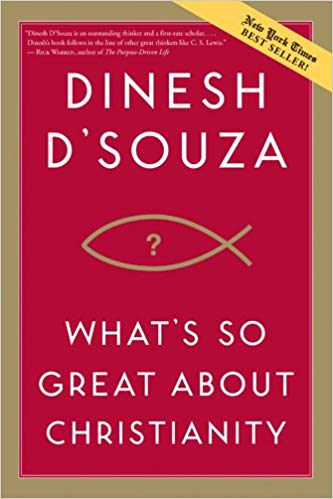A Brief Book Summary from Books At a Glance
About the Author
Dinesh D’Souza, a former White House domestic policy analyst, is the author of five New York Times bestsellers. He is a prominent public intellectual for Christianity.
Introduction
In this book, D’Souza examines typical objections to the validity of the Christian faith. He interacts with many contemporary atheists and attempts to demonstrate that Christianity is more rational than the alternatives. D’Souza presents evidence and arguments for Christianity, both theoretically and practically.
Table of Contents
Part I: The Future of Christianity (Chapters 1-4)
Part II: Christianity and the West (Chapters 5-7)
Part III: Christianity and Science (Chapters 8-10)
Part IV: The Argument from Design (Chapters 11-14)
Part V: Christianity and Philosophy (Chapters 15-17)
Part VI: Christianity and Suffering (Chapters 18-19)
Part VII: Christianity and Morality (Chapters 21-24)
Part VIII: Christianity and You (Chapters 25-26)
Summary
Part I: The Future of Christianity
Christianity is the world’s fastest growing religion, and belief in God is soaring across the globe. Secularism is fading in importance around the world, and traditional religions are experiencing a resurgence. Liberal Christianity which compromised traditional doctrines for cultural accommodation is diminishing. The secularization thesis held that with advances in education and technology, religion would increasingly disappear, but this thesis has proven to be false. America is the most advanced and the most religious country in the Western world. Western Christianity is no longer representative of global Christianity; the balance has shifted to the South and the developing world. Unlike Westerners, many Christians around the world understand from experience the type of cultural and economic challenges that were present in biblical times.
The historical phenomenon of religious belief all around the world has always been a challenge for secularists who hold to evolution. Why would people evolve to hold such false beliefs? Religious sacrifice of time and resources actually seems to count against survival and reproduction. Atheists have put forward explanations, but they explain nothing. The real reason for this pervasive belief in God is that God made us to know him. Religion connects people in community and gives meaning to life. Secularists reproduce at a rate below population replacement. Religious people appreciate life, are more hopeful for the future, and more charitable.
More people claim to be atheists in America than ever before. The distinguishing feature of much of Western atheism is its confidence and feeling of moral superiority. Some atheists call themselves “brights” and dismiss religious believers as ignorant, stupid, and superstitious. Atheists insist that science has disproven religion and that it is the exclusive arena where knowledge is found. Evolution is seen as the ultimate explanation for the existence of life and for every aspect of human experience. God is seen as unnecessary, and also as immoral. Many atheists self-style themselves as heroes who are throwing off ignorance and bravely forging a new path. They also want to indoctrinate children—including the children of religious parents—into their secular ideology. This trait is easily observed in their arguments for only teaching Darwinian evolution in schools without mentioning evidence for a Creator. Through science and education, the idea is that religious belief will be marginalized and disappear. Some are candid enough to admit that this will take place through ridicule and dismissiveness.
Part II: Christianity and the West
Given the fact that Western civilization was built on Christianity, it is strange to see so many people attacking it. Today the problem is not too much knowledge of religion, but too little. Western society was built on both Jerusalem and Athens (with the latter interpreted through the former). Christianity formed our laws, art, education, morals, etc. Secular values of today were rooted in Christian morality. Jews and Christians were monotheists who insisted that their God was not merely a tribal deity, but the God of every nation. Augustine argued that Christians were citizens of heaven even though they lived on earth, and as a result government had limitations of authority over its people. There are also limits on the authority of the church. At its best, the church has recognized that theological principles and the church’s limited sphere of authority should usher in religious tolerance and freedom of belief.
[To continue reading this summary, please see below....]The remainder of this article is premium content. Become a member to continue reading.
Already have an account? Sign In
